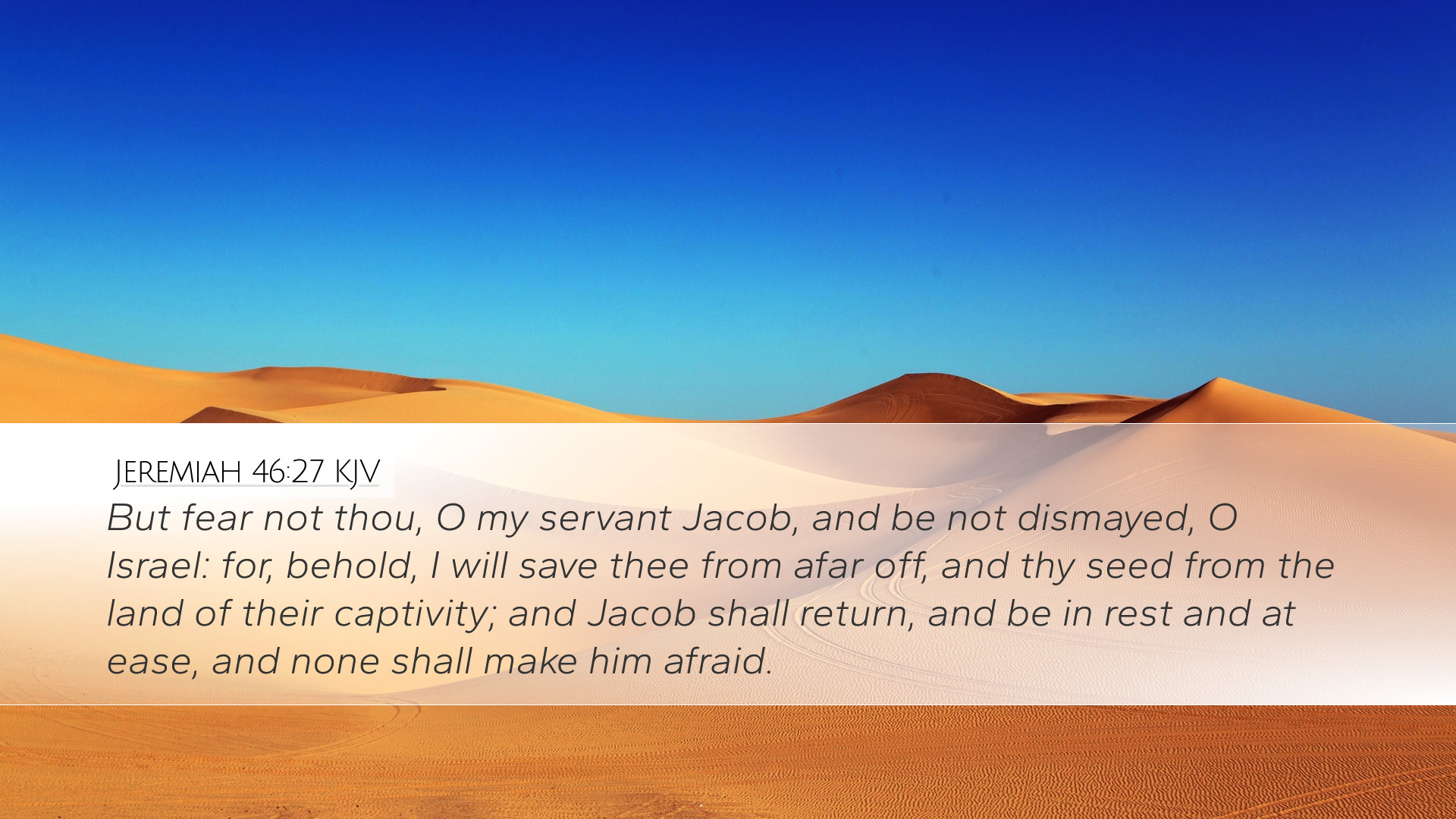Commentary on Jeremiah 46:27
Jeremiah 46:27 states, "But fear not thou, O my servant Jacob, and be not dismayed, O Israel: for, behold, I will save thee from afar off, and thy seed from the land of their captivity; and Jacob shall return, and be in rest and at ease, and none shall make him afraid." This verse serves as a profound assurance from God to the nation of Israel amidst impending judgment and chaos.
Contextual Background
The book of Jeremiah predominantly addresses themes of judgment and restoration. Jeremiah prophesies during a tumultuous period characterized by the decline of the southern kingdom of Judah and the looming threat from Babylon. His message is often a somber warning about the consequences of Israel's disobedience, but interspersed throughout are glorious promises of hope and restoration.
Verse Analysis
“But fear not thou, O my servant Jacob”
God addresses Jacob (representative of Israel) with terms of affection and reassures him in the face of fear. Matthew Henry emphasizes that God's designation of Jacob as His servant indicates a relationship built on covenant love and loyalty. In the midst of trial, Jacob is reminded that he is not abandoned but cherished.
“and be not dismayed, O Israel:”
Albert Barnes points out that the term “dismayed” conveys a sense of bewilderment and despair. God admonishes Israel against such feelings that arise from the terror of impending disasters. He encourages them to place their trust in His sovereignty, reminding them that fear can be dispelled by faith in God’s promises.
“for, behold, I will save thee from afar off”
This segment of the verse conveys God's promise of salvation, even from a distance. Adam Clarke elucidates this idea by interpreting "afar off" spiritually and geographically: God’s intervention will extend beyond the immediate circumstances, emphasizing His omnipresence and eternal reach. It reassures the exiled Israelites that their salvation is guaranteed regardless of their current disposition.
“and thy seed from the land of their captivity;”
Jeremiah highlights a dual aspect of God's promise: the preservation of Israel and the restoration of their future generations. Matthew Henry comments on the significance of “thy seed,” which denotes hope not just for the present but also for the future. It underscores the covenantal nature of God’s promises — the relationship with Israel is not merely for one generation but extends across time.
“and Jacob shall return, and be in rest and at ease,”
The promise of return carries with it connotations of not only physical restoration but also spiritual peace. Albert Barnes interprets "rest and at ease" as a state of security as opposed to the turmoil they were experiencing. It is a promise of tranquility that comes from faith and obedience. God reassures Israel that peace will follow their deliverance.
“and none shall make him afraid.”
Finally, this phrase encapsulates the ultimate comfort of God’s promise: a state free from fear. Adam Clarke notes that living in constant fear can lead to despair; hence this divine assurance serves as a climax of hope and restoration. This promise reflects God’s intention to not only deliver His people but also to restore their dignity and confidence.
Theological Implications
The overarching theme that emerges from Jeremiah 46:27 highlights God’s unwavering commitment to His people despite their failures. Here are some key theological implications derived from the verse:
- God's Sovereignty: The assurance given to Jacob is a testament to God's sovereign control over history and nations. Even in moments of despair, God delineates the eventual hope that His people can cling to.
- Restoration and Hope: The narrative of exile in Jeremiah emphasizes that God’s promise of restoration can be expected even in dire circumstances. This engenders hope for current and future generations.
- Covenant Relationship: The terminology used in addressing Jacob showcases the depth of the covenant relationship. It emphasizes that God's promises are tied to His faithfulness.
Application for Today’s Believers
Believers today can draw profound comfort from Jeremiah 46:27. As pastors, theologians, and students of the Bible reflect on this verse, they are reminded that God’s promises remain valid in every generation. They are called to encourage their communities that fear and dismay have no place in the life of a believer, as the assurance of God’s saving power transcends time and space.
Moreover, the message invites introspection into the believer’s relationship with God. Are we embodying the trust that God calls us to maintain, especially in turbulent times? The promise of restoration is as relevant today as it was for the Israelites, serving as a beacon of hope amid the uncertainties of life.
Conclusion
Jeremiah 46:27 remains a pillar of encouragement amidst hardship. Drawing on insights from historic commentaries reveals a rich tapestry of God’s promises to His people. The complexities of this verse illuminate themes of loyalty, salvation, and restoration. Believers are reminded to place their trust in God’s unwavering promises, transcending their fears and finding rest in His faithfulness.


